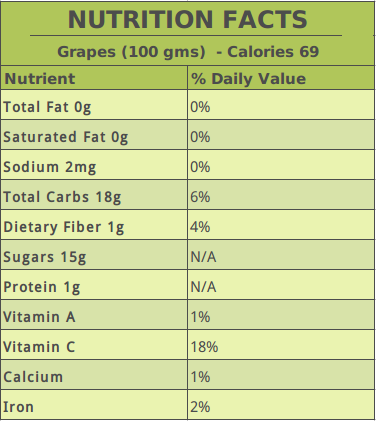
Grapes are a widely popular and nutritious fruit. Technically a berry, a cluster of grapes has many useful purposes, such as making wine, jam, juice, jelly, grape seed extract, raisins, vinegar, and grape seed oil.
Of all the table grape varieties, green seedless grapes and black grapes are the most popular. But, as delicious as they are, are grapes fattening? Do grapes contain sugar? Let’s read on to find out more about this tasty little fruit.
Are Grapes Fattening?
We tend to load up on them far too much because grapes are one of the most convenient fruits to eat—we don’t need to peel or chop them. They are highly nutritious fruits that make for a good snack food. But are grapes fattening, or are grapes good for weight loss?
A major factor to take into account is the calories in grapes. Calorie count matters a lot if you are trying to lose weight because they come in the form of fats, carbs, and protein. Eating fewer calories than you burn helps with weight loss.
Grapes are not fattening. The calories in grapes are low—about 70 calories for a 100-gram serving. They also have a good amount of dietary fiber. As a result, eating grapes will help keep you full for a longer period.
There seems to be a connection between eating grapes and weight loss. You see, calories are units of energy required by the body to perform daily activities.
In the absence of calories, the body draws energy from the fat reserves to make up for the calorie deficit. The subsequent breaking down of fat deposits induces weight loss. Thus, eating grapes in moderation will keep you full while working towards your weight loss goals.
The calories in black grapes are 60 for half a cup serving, whereas the calories in red seedless grapes are 55 for the same serving size.
Most of the calories in grapes come from carbohydrates in the form of sugars and dietary fiber. Only one percent of calories comes from fat, and this is dietary fat which is healthy. Sugar in the form fructose provides instant energy to the body.
Nutrition Facts of Grapes
One of the main culprits of weight gain is sugar or sweet cravings. Grapes are characteristically sweet as they have a good sugar content. So, grapes can satisfy your sweet cravings without giving you as many calories as other sweet food items.
But, because of grapes’ sugar content, are grapes fattening? Absolutely not! The sugar content of natural foods like grapes does not pose a grave threat to our health like that of white or refined sugar. Also, the dietary fiber in grapes helps in the controlled release of insulin.
Grapes do have a good amount of sugar; however, the total carbohydrate content for a 100-gram serving is just 18 grams. The glycemic index of black grapes is 59, while the glycemic load is 11.
Grapes’ Nutrition Chart
According to Harvard Medical School, a glycemic index up to 50 and glycemic load up to 10 are considered low. Therefore, grapes have a low to medium glycemic index and glycemic load.
However, people who have diabetes should practice caution or consult their doctor before eating grapes regularly. This also applies to people who have insulin resistance because of health conditions such as polycystic ovaries. Insulin resistance is an underlying cause of obesity and being overweight.
On the brighter side, grapes are a good source of potassium, copper, manganese, and vitamins. They are particularly rich in Vitamins K and C but also have trace amounts of vitamins A, E, and B. Grapes are low in saturated fat and calories.
A cup of 100 grams of grapes offers 18% DV of vitamin K, 18% DV of vitamin C, one percent DV of vitamin A and calcium, six percent DV of copper, and five percent DV of potassium.
According to doctors, grapes can burn cholesterol naturally. Grapes, especially the dark variety like muscadine grapes, are rich in ellagic acid. Ellagic acid supposedly has fat-burning properties.
In a study conducted by Oregon State University, researchers found that ellagic acid, when exposed to human fat cells and liver cells, can hamper the growth of existing fat cells.
It also inhibits the formation of new fat cells. Ellagic acid improves the liver cells’ ability to metabolize fatty acids. But, that is not to say you should overconsume grapes. Eat grapes in moderation to boost your metabolism and aid in weight loss.
Now that you know the nutritional facts about grapes, let’s see how you can include them in your diet.
How to Eat Grapes for Weight Loss
In a calorie-restricted 1,200-calorie diet plan, you can easily have a cup of Concord grapes as a snack. Concord grapes provide only 62 calories per cup, which is just five percent of the recommended daily caloric intake.
European-style table grapes, such as the red and green grapes, are also favorable. A cup of these grapes has 104 calories, which is nine percent DV of calories on a 1,200-calorie diet, or six percent on a 1,800-calorie diet plan.
Since grapes have dietary fiber and are low in calories, you should include them in your daily meals. You can have them as part of your breakfast or as an afternoon snack.
Add them to your whole grain porridge, smoothie, and oatmeal, or simply have them on their own. Also, you can mix grapes with other fruits to make a fruit salad.
Health Benefits of Grapes
Grapes are rich in polyphenols, a type of antioxidant. The skin of grapes contains a polyphenol called resveratrol. It reduces free radical damage and slows down the aging process.
Grapes also contain pterostilbene, a compound closely related to resveratrol. A stilbenoid compound, pterostilbene can potentially reduce cholesterol levels. They have trace amounts of phytosterols which also help in lowering bad cholesterol levels.
Grapes improve digestion as well. They work as a laxative due to their good insoluble fiber composition.
Insoluble fiber remains intact in the digestive tract and supports the formation of bulk for healthy stools. So, regular consumption of grapes can relieve constipation and improve bowel movements.
Furthermore, grapes can fight and inhibit cancer cell growth. They can also be administered to treat conditions such as heart disease and diabetes, along with assisting in weight loss.
Related:
Sources:
Cespedes, A., “Can Eating Grapes Help Me Lose Weight?” Livestrong, December 11, 2015; http://www.livestrong.com/article/416496-can-eating-grapes-help-me-lose-weight/, last accessed April 11, 2017.
Wahlig, H., “Do Grapes Help Your Digestive System?” Livestrong web site, January 16, 2017; http://www.livestrong.com/article/531082-do-grapes-help-your-digestive-system/, last accessed April 11, 2017.
Tremblay, S., “Grapes and Weight Loss,” Livestrong, December 9, 2015; http://www.livestrong.com/article/289150-grapes-for-weight-loss/, last accessed April 11, 2017.
“Lose Weight Now With The Grape Diet,” Fitmc; http://www.fitmc.com/lose-weight-now-with-the-grape-diet/, last accessed April 11, 2017.
“Glycemic index and glycemic load for 100+ foods,” Harvard Health Publications, August 27, 2015; http://www.health.harvard.edu/diseases-and-conditions/glycemic_index_and_glycemic_load_for_100_foods, last accessed April 14, 2017.
“Grapes, red or green (European type, such as Thompson seedless), raw Nutrition Facts & Calories,” http://nutritiondata.self.com/facts/fruits-and-fruit-juices/1920/2, last accessed April 12, 2017.















